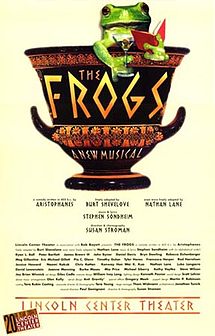
The world is in a bit of a mess. The art of good theater and literature in general has gone downhill, and things seem to be going to pieces. The Greek god Dionysus decides that he won't stand for this nonsense, and sets off with his Deadpan Snarker slave Xanthias to bring George Bernard Shaw back from Hades to set things back on track. What follows is a hilarious journey as the pair try to break into the Underworld, are beset by singing frogs in Hades (the creatures hate change and want things to stay the way they are), and finally must decide if Shaw really is the best playwright to bring back to life.
An adaptation of a play by Aristophanes, this musical was created for a college performance at Yale in 1974. Written by Burt Shevelove with music and lyrics by Stephen Sondheim, it was based on an adaptation that Shevelove had written and directed during his own senior year at Yale in 1941. It was staged in the college gymnasium, with the scenes involving the River Styx and the frogs being performed in the pool, with the Yale swimming team (hence lines in the original opening song, begging the audience not to swim during the performance). In 2004, Nathan Lane expanded the show into a full-length musical, writing the new book himself (Shevelove having passed away in 1982) with Sondheim contributing seven new songs. This expanded version played on Broadway with Lane and Roger Bart as the leads.
Tropes in this work:
- An Aesop: Dionysus gives one to the audience in the final number, in which he warns everyone about the dangers of apathy and how important it is to take action before the world falls apart.
- Breaking the Fourth Wall: The very first number, "Instructions to the Audience", has the actors playing the leads go onstage and instruct the audience how to behave (turn off cell phones, don't talk during the performance, etc). The finale number, which is a reprise, has Dionysus directly address the audience with a plea to not stand by while everything falls apart around them.
- Dumb Muscle: Hercules, if only because he went to the Underworld for one of his Twelve Labors and tells Dionysus how it's a horrible place that he'll need a disguise to get into, when it's really a very pleasant place. Lampshaded by Pluto, who notes that Hercules "isn't the brightest flame in the candelabra".
- Everyone Hates Hades: Subverted. The song Hades
 is all about how great the Underworld is, and how awesome everyone finds living there to be.And you get to live in Hades/Where it's always 2 A.M.!/ Where you party 'till you drop/ And it never stops/ 'Cause there's nothing we condemn!
is all about how great the Underworld is, and how awesome everyone finds living there to be.And you get to live in Hades/Where it's always 2 A.M.!/ Where you party 'till you drop/ And it never stops/ 'Cause there's nothing we condemn! - Happily Married: Dionysus and Ariadne.
- A Hell of a Time: The Underworld turns out to be a pretty nice place, all things considered.
- Hijacked by Jesus: Subverted in general, as the musical remains faithful to Aristophanes's play, however there are a few instances where the characters (including Hades himself) refers to the Underworld as "hell". In some cases it's clearly a case of the character not understanding the Underworld, and the place is shown to be quite pleasant.
- Leaning on the Fourth Wall: When Dionysus goes to Pluto and begs him to allow George Bernard Shaw to come back to Earth, Pluto and the Greek Chorus point out that it's very naive (if optimistic) to think that one playwright's works would be all it would take to change the world. The Greek Chorus follows up by singing for Dionysus to relax because "It's only a play!"
- The Lost Lenore: Ariadne.
- Promoted Fanboy: In-Universe, Dionysus, a massive fan of Shaw's work, squees at being able to meet his idol.
- Self-Deprecation: In the "Instructions to the Audience", one of the instructions is that "if by a sudden miracle / A tune should appear that's lyrical, / Don't hum along". May also double as Take That, Critics!, considering how Sondheim's songs once were criticized for being too complex to hum along to.
- Servile Snarker: Xanthias.
- Setting Update: A Classical Greek play updated to, well, some time after Shaw's death.
- Shout-Out:
- The last line of the title song (spoken by Xanthias after seeing his master attacked by a giant frog) is "I think we're gonna need a bigger boat."
- When Dionysus tries on Hercules's lion skin and asks Xanthias, "How do I look?", Xanthias replies, "Like the Circle of Life has stopped."
- We Are as Mayflies: One of the few things that makes Dionysus act truly sorrowful is the memory of his wife, who died years ago because she was mortal and he was not.She was young, she was shy. Ariadne! She was young, so was I, surely she was much too young to die!
- You Bastard!: A mild example. At the end of the play, Dionysus tells off the audience for agreeing with him just because he's a god and implying that many are or soon will be fine with sitting and letting the world fall apart rather than try to change things.
